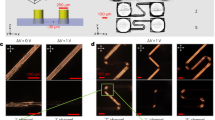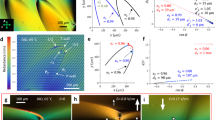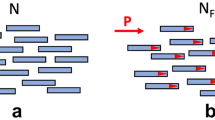Abstract
IT has long been known that nematic liquid crystals show remarkable orientation effects in electric fields as well as in magnetic fields1. We have observed the formation of domains in thin layers of the liquid crystal phase of several organic compounds. Typical results were obtained with p-azoxyanisole,  The domains form in electric fields of about 3,000 V/cm. Their appearance and behaviour suggest several properties of liquid crystals which have not previously been reported.
The domains form in electric fields of about 3,000 V/cm. Their appearance and behaviour suggest several properties of liquid crystals which have not previously been reported.
This is a preview of subscription content, access via your institution
Access options
Subscribe to this journal
Receive 51 print issues and online access
$199.00 per year
only $3.90 per issue
Buy this article
- Purchase on Springer Link
- Instant access to full article PDF
Prices may be subject to local taxes which are calculated during checkout
Similar content being viewed by others
References
Kast, W., Z. Physik, 71, 39 (1931). Freedericksz, V., and Zolina, V., Trans. Farad. Soc., 29, 919 (1933). Zwetkoff, V., Acta Physicochimica URSS, 6, 865 (1937).
Gray, G. W., Molecular Structure and the Properties of Liquid Crystals (a photograph of the threads is shown in Plate 3) (Academic Press, New York, 1962).
Maier, W., and Saupe, A., Z. Naturforschung, 14, a, 882 (1959).
Author information
Authors and Affiliations
Rights and permissions
About this article
Cite this article
WILLIAMS, R. Liquid Crystals in an Electric Field. Nature 199, 273–274 (1963). https://doi.org/10.1038/199273a0
Issue Date:
DOI: https://doi.org/10.1038/199273a0
This article is cited by
-
Moiré nematic phase in twisted double bilayer graphene
Nature Physics (2022)
-
A morphogenic process in low-energy electromagnetic fields
Journal of Biological Physics (1988)
-
Effects of an alternating electric field on the transparency of a thin field of the smectic phase of p-type n-Octylhydroxybenzoic acid
Soviet Physics Journal (1970)
-
Domain Structures in Liquid Crystals, induced by Electric Fields
Nature (1965)
Comments
By submitting a comment you agree to abide by our Terms and Community Guidelines. If you find something abusive or that does not comply with our terms or guidelines please flag it as inappropriate.



